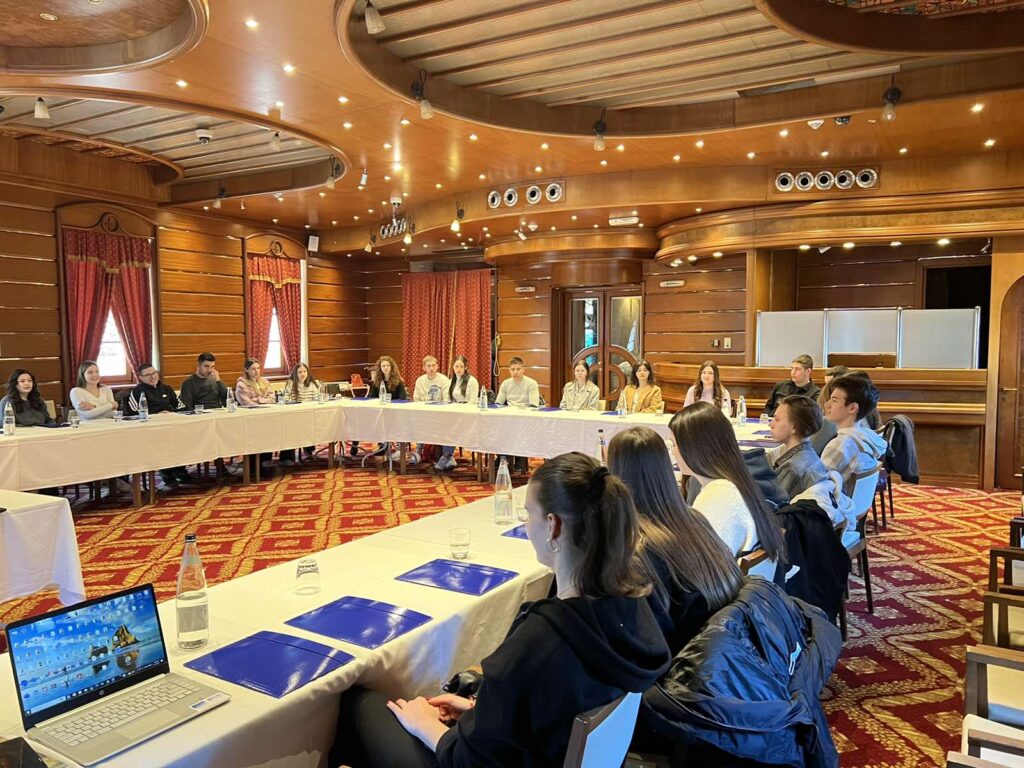Education encourages youth activism, and that segment is significantly lacking in the formal education system, making informal programmes by non-governmental organizations invaluable for fostering youth networking and their engagement in the community. This was, among other, concluded at the Youth Activism School for high school students from the Southern region of Montenegro, organized by the Centre for Civic Education (CCE) in Kotor on 15 and 16 February 2024, with the support of the United States Embassy in Podgorica through the Democracy Commission Small Grants Program.

The focus of this two-day training was youth activism, human rights, mechanisms for their protection, advocacy modalities for human rights and empowerment of marginalized and vulnerable communities, rhetorical skills, aas well as the creation of youth initiatives. The program was interactive, with brief introductory lectures followed by workshops, group work, film screenings, simulations, and open discussions.
“To me, such programmes are significant as they provide information about the times we live in and the needs of society. We, the youth, need these educations to expand our knowledge, build our attitudes, and spend our time meaningfully,” assesses Božo Gunjajević, a student at the Maritime High School.
“This Youth Activism School is an excellent way to encourage young people to participate in many social issues, topics, debates, etc., as it contributes to raising awareness of civic responsibility that we all should have. Also, it is important that we discussed marginalized and vulnerable communities/groups that are still, unfortunately, ‘taboo’ topics for us. As long as we remain silent about the problems of any community, society will not progress towards a value system that include tolerance, understanding, empathy, etc. That is why I think such programmes should be organized more often in Montenegro,” says Staša Pejaković, a student at the Kotor Gymnasium.
“In my opinion, this Youth Activism School is a fantastic opportunity for young people to learn about diversity, about other people in general. For me, this is significant because I am supplementing some of my knowledge, but it is also an opportunity to express my opinion and hear others. Young people deserve such programmes because this can be significant for shaping their views of the world,” said Jovan Joksimović, a student at the Vocational High School in Bar.
“This school is useful to me because it addresses all the topics close to my community – the community of young people. I am now more familiar with topics I did not even know well; the programme opened my eyes and sparked my interest in some new ones. The session on public speaking made the strongest impression on me as it brought certain aspects closer that will be useful to me in the future, and it is also an area I want to improve,” notes Marta Borović from the Kotor Gymnasium, sharing her impressions.
A similar sentiment is shared by Luka Pejaković, a student at the Maritime High School in Kotor. “This education is important because it helps me better understand topics I thought I knew enough about, but after being explained by lecturers, I realized that some of my assumptions were wrong. This is an exceptionally beautiful school, and I will recommend it to my peers to apply for future competitions,” he emphasized.
“Human rights are the expression of humanity’s historical struggle to resist inequality and the desire for everyone to have equal rights from birth to death. The fight to achieve these rights has been going on for centuries and is not over. Through my lecture, participants in the Youth Activism School were introduced to national and supranational mechanisms for the protection of human rights, to gain knowledge and skills that will benefit their further professional development and raise awareness of the importance of fighting for their rights,” said Judge Andrija Vojvodić, one of the lecturers at this Youth Activism School.
“Young people are showing interest in understanding the problems the Roma community faces, which is very important when all our research indicates a high level of ethnic distance towards the Roma. Those who want to be active in their local community need to know how they can contribute. It is essential for them to learn who the Roma they want to help are, and then how to recognize the problem and know how to devise some possible solution or action to help solve or reduce the problem,” said Elvis Beriša, Executive director of the NGO Walk With Us/Phiren Amenca, who led the session on the problems faced by minorities in Montenegro.
The goal of the Youth Activism School is to build the capacities of young people to position themselves as active citizens who contribute to social changes and the promotion of human rights in Montenegro.
Lecturers and workshop leaders at the Youth Activism School were experts in the fields of education, justice, human rights, and activism. Participants were young people from four high schools and five municipalities in the southern region of Montenegro, namely from Tivat, Budva, Herceg Novi, Kotor, and Bar.
The Youth Activism School was attended by 30 high school students: Jovan Joksimović, Božo Gunjajević, Barbara Janjalija, Andrea Gobović, Tara Đuričković, Vojin Begović, Elena Senić, Kristina Popović, Dragica Popović, Naida Kujović, Marija Gegović, Andrija Milošević, Tijana Marković, Nina Radović, Sara Šćekić, Andrijana Korać, Nina Milić, Elena Labović, Feliks Koba, Božana Vidović, Marta Borović, Drago Rapovac, Nikoleta Stanković, Asija Kujović, Minela Ličina, Vasilije Ševaljević, Luka Pejaković, Gorana Ćuk, Dragana Tujkovic, and Staša Pejaković.
Maja Marinović, Program Associate

